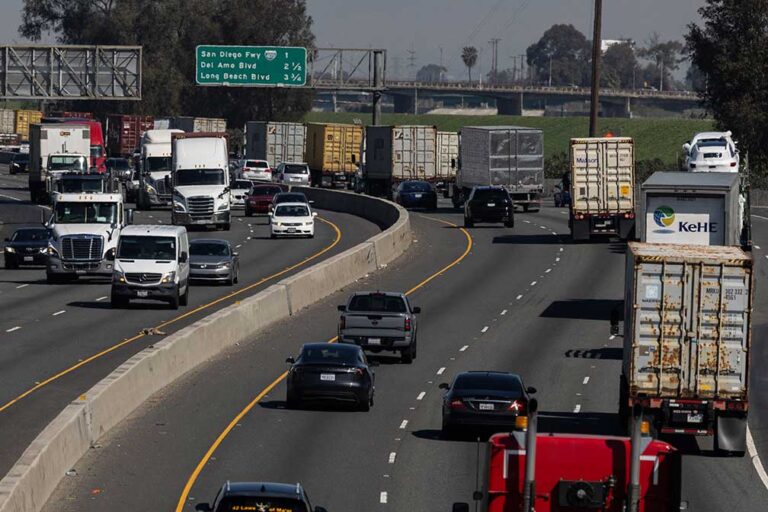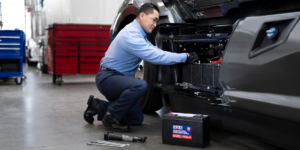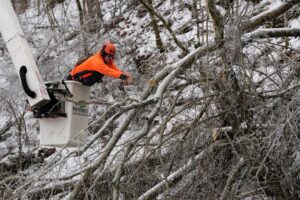LOS ANGELES (AP) — California regulators have released a new proposal to allow the testing of self-driving heavy-duty trucks on public roads.
The state’s Department of Motor Vehicles (DMV) announced proposed regulations Friday, April 25, to allow the testing of self-driving vehicles that weigh over 10,001 pounds, opening the door for companies to test self-driving technology with previously prohibited autonomous commercial semi-trucks on the road.
Regulators say self-driving heavy-duty trucks are already being tested in other states including Texas, Arizona and Arkansas. California is the only state with regulations that explicitly ban them.
The regulations are subject to a public comment period that ends June 9, 2025. Written comments may be submitted to [email protected] during the 45-day period.
They will likely face pushback from the labor unions that represent the state’s hundreds of thousands of commercial truck drivers, who are concerned about safety and losing truck driving jobs to automation in the future.
The California Legislature passed a bill in 2023 to require human drivers aboard self-driving trucks, but it was vetoed by Gov. Gavin Newsom, who said additional regulation was unnecessarily because existing laws governing self-driving vehicles were sufficient.
The proposed regulations will also enhance data-reporting requirements for manufacturers, such as reporting instances when cars stop in the middle of an active road for any reason and need to be retrieved. They will give the state’s DMV more authority to apply “incremental enforcement measures” against companies instead of fully suspending their testing permits.
NHTSA unveils new automated vehicle framework
The California DMV’s announcement came just one day after the National Highway Traffic Safety Administration (NHTSA) announced its new Automated Vehicle (AV) Framework as part of the U.S. Department of Transportation’s “transportation innovation agenda.”
“This administration understands that we’re in a race with China to out-innovate, and the stakes couldn’t be higher,” said U.S. Secretary of Transportation Sean Duffy. “As part of DOT’s innovation agenda, our new framework will slash red tape and move us closer to a single national standard that spurs innovation and prioritizes safety.”
According to a statement from the USDOT, the first actions under this framework will help accelerate work toward modernizing Federal Motor Vehicle Safety Standards (FMVSS) to blaze a path for the safe commercial deployments of AVs while improving both safety and mobility for the American people.
The AV Framework will follow three principles, according to the USDOT:
1. Prioritize the safety of ongoing AV operations on public roads.
To prioritize safety, NHTSA will retain its Standing General Order (SGO) on Crash Reporting for vehicles equipped with certain advanced driver assistance systems (ADAS) and automated driving systems (ADS). At the same time, the agency says, it will streamline the reporting to sharpen the focus on critical safety information while removing “unnecessary and duplicative” requirements.
2. Unleash innovation by removing unnecessary regulatory barriers.
NHTSA is expanding the Automated Vehicle Exemption Program (AVEP) to include domestically produced vehicles. Previously the program was open only to imported Avs.
3. Enable commercial deployment of Avs to enhance safety and mobility for the American public.
According to the USDOT’s April 25 statement, the AVEP promotes vehicle innovation and safety through simpler, faster exemption procedures that allow companies to operate non-compliant imported vehicles on U.S. roads. The new AV Framework “levels the playing field” by expanding AVEP to domestic vehicles while eliminating a “needless” roadblock to innovation. NHTSA announced the change via an open letter to AV developers.
“By streamlining the SGO for Crash Reporting and expanding an existing exemption program to domestic vehicles, we are enabling AV manufacturers to develop faster and spend less time on unnecessary process, while still advancing safety,” said NHTSA Chief Counsel Peter Simshauser. “These are the first steps toward making America a more welcoming environment for the next generation of automotive technology.”
The Trucker news staff contributed to this report.
The Associated Press is an independent global news organization dedicated to factual reporting. Founded in 1846, AP today remains the most trusted source of fast, accurate, unbiased news in all formats and the essential provider of the technology and services vital to the news business. The Trucker Media Group is subscriber of The Associated Press has been granted the license to use this content on TheTrucker.com and The Trucker newspaper in accordance with its Content License Agreement with The Associated Press.











